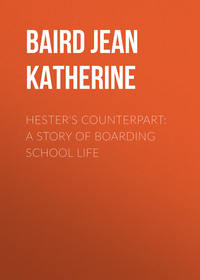 полная версия
полная версияElizabeth Hobart at Exeter Hall
“I’m glad we met you,” she exclaimed. “You are miners? Then you can tell me how to reach Mr. Dennis O’Day. I must reach him to-night – within a few hours. I have a message for him.”
They talked among themselves.
“What’s the message?” one asked in broken English.
“It’s not to be told to every one,” she replied. “If you will tell me who your leader is, I’ll whisper it to him.”
“Ivan,” they cried, pushing a Slav forward, and retreating into the shadows.
Bending over, Nora mentioned “Militia.” The word was magic. Then she grew impatient. “Why do you try to keep us here?” she exclaimed. “Didn’t Ketchomunoski fire two guns? Wasn’t that to let you know we would come this road and that you should let us pass? We are wasting time. I must reach my father with this message. Good night! Jefferies, drive on.”
The men made no effort to detain them as the carriage started. It was past one o’clock when they reached the top of the mountain and came to the outskirts of the town. “The Miners’ Rest” was less than a mile distant. But the horses were tired out. Jefferies could not get them out of a slow walk.
“We’ll go at once to ‘The Miners’ Rest,’” said Miss O’Day. “I’ll see my father there. If the miners are planning any trouble, they’ll be there, too.”
Driving into a little wood, Jefferies drew rein. Climbing down from his place, he took out a strap and tied the horses to a tree.
“They wouldn’t let us drive through town,” he explained. “The streets will be filled with the strikers. We’ll walk, keeping in the shadows. It’s a blessed good thing for us that it rains.”
He helped the girls to alight, then strode on ahead, skirting the edge of the wood.
“If you see me stop, then you stop,” he said. “Don’t come on until I say so. If you hear me talk to anyone, wait and don’t speak.”
Clasping hands, the girls slowly followed. The side of the road was filled with clods. The road itself was mud to the shoe tops. Many times they stumbled and almost fell. Only at intervals could they see the form of their guide.
When they reached the main street, Jefferies paused. It was filled with miners, each with his lantern. These lights helped Jefferies to determine his next move. He saw in which direction the crowd tended. The murmur of many voices could be heard; but there was no uproar.
“The women will either be out in the street with the men, or home asleep,” he said at last. “Either way, we’re safe. We’ll cross here and get behind this row of houses and keep on until we’re close to ‘The Miners’ Rest.’ They’ll see us then. But no matter.”
Slowly they pushed their way through backyards. Fortunately there were no division fences. The winter’s crop of ashes and tin cans was beneath their feet. They stumbled, ran into barrels and boxes, waded through mud holes, yet Nora’s spirits never flagged.
As they came to the last of the houses, Jefferies again paused until Nora and Elizabeth came up to him.
“There at the corner is ‘The Miners’ Rest,’” he said, pointing to a low, wooden building.
“That ramshackle affair!” cried Nora. “Somehow I had the impression it was a big hotel.”
“They don’t need that kind among miners,” was the reply. “This is just a drinking-place, nothing more. Every miner in Bitumen is there. Look at those women. They’re worse than the men.”
A group of women with hair hanging, dressed in dirty wrappers, and shawls about their shoulders, stood together under the flickering corner lamp. To judge from their gesticulations, they were much excited. They were all talking at once and shaking their clenched fists in defiance.
“Are you afraid to go through that mob?” asked Jefferies.
“No; we dare not be afraid of anything now. Push ahead, Jefferies, straight to the door, and on through until I find my father. Don’t stop. We’ll keep at your heels. Draw down your veil, Elizabeth, and put up your collar. Don’t speak or tell who you are. Remember the miners know you.”
Following her suggestion, Jefferies crossed the street, pushing his way through the throng, as though he was expected. The girls kept close to him, so close that Nora could have reached forth and touched his arm. The mob of men scarcely noticed him. Indeed, few knew that the two girls had slipped through the crowd. They were talking in half a dozen different tongues and dialects. The effect was like a pack of dogs snarling. No attempt was made to stop the three. They reached the door and Jefferies entered, followed by the girls. Nora’s cheeks were crimson with embarrassment. She was trembling. Her nerves had been so wrought upon that she was ready to cry. But that would spoil all. She must control herself.
Behind the bar was a room devoted to conferences of the leaders of the strike. Toward the door leading to this Jefferies made his way. The men in the bar-room stopped talking to look at the girls. It was unusual to see women in this place.
Nora, feeling herself conspicuous, with a desire both to justify her presence there, and to protect herself and companion, exclaimed, “My father is in that room, Mr. Jefferies. Ask for Mr. O’Day. Tell him his daughter has come with an important message.”
The men stepped aside, leaving her way clear. Her words had carried into the inner room. The door was flung open from within, and Dennis O’Day stood there.
“You!” he exclaimed. “Good heavens, Nora, how did you get here at such a time? Come here,” and he drew the girls into the inner room. He dismissed at once the half dozen men gathered there. “In half an hour,” he said significantly as they passed out. “Not a minute before that. I must see what has brought my daughter here.”
Elizabeth, drenched and with draggled skirts, sank into a chair. She had not raised her veil. Dennis O’Day did not recognize her as the little girl whom he had seen many times playing about the superintendent’s yard. She was so nearly exhausted that she could not stand. She let her head fall over upon the table.
Dennis O’Day glanced from the drooping figure back to his daughter as though asking an explanation. “My dearest friend at Exeter, father,” was the reply to the unspoken question. “No one else in the world, except yourself, has been so kind to me.” She came closer to Dennis O’Day, touching his sleeve with her finger-tips. His little world had always trembled in fear of him. His daughter alone stood fearless in his presence. She was the only being in the world he loved. For an instant he looked into her face. Her perfect features and rich coloring delighted him. He was glad that she was beautiful.
“Well, Nora, what is it that has brought you to Bitumen at this of all times?” he asked, putting his arm about her and drawing her close to him.
“The strike.”
“The strike! It is just the reason that you shouldn’t be here. I’ve a notion to cart-whip Jefferies for bringing you. You might have been shot by the miners.”
“So I might. But Jefferies wasn’t asked anything about it, daddy. I told him he had to bring me here before morning, and if he killed the horses by hard driving, you’d pay for them.”
Dennis O’Day laughed. He liked her audacity. “But suppose I wouldn’t?”
“But you would. You have never failed me yet, daddy, and you never will. It doesn’t matter much what happens, you’ll stand by me. That is why I felt so sure about coming. Dr. Morgan did not wish me to. She said it would be useless. But she yielded when I insisted that you would do what was right. And you must do it now, daddy.” She drew down his head to kiss him. “You must keep the miners from attacking the mines to-night.”
“I? I’m no miner! What have I to do with the strike? If the men attack that miserable little sneak of a superintendent, what have I to say?”
“Everything. You are not a miner, but they do as you say. They do not know it is so, but you do. I want you to go out there; tell them – tell them anything, only so they do not make the attack to-night.”
“Nonsense. Even if they should do as I say, what’s the odds? I’ve no love for that man Hobart. He’s been fighting me for years. He’ll get no more than he deserves. No, no, Nora. Girls mustn’t meddle.”
“You won’t go?”
“No; ask me anything else than that.”
“Then I’ll tell you what I’ll do. The National Guards are on their way now. When they come, I’ll give them all the information they wish. I know who urged this on. I know who killed the Italian. Oh, I know lots of things that I’ve kept to myself because my telling would harm you. But – ” She was excited. Whether she pretended this high state of emotion, or whether it was real, was difficult to tell. She had flung open her coat. The vivid coloring of her gown, her crimson cheeks and flashing eyes made a brilliant bit of coloring in the dark room lighted by a solitary, smoking oil-lamp. Her tones were clear and decisive.
“Why, Nora, listen to reason. How – ”
“No, I will not listen to anything but your promise to go and stop that mob. Listen to them yelling like a pack of hyenas. I’m not through yet. You must choose and choose quickly. Stand by the miners or me. If you forsake me, I’ll never see you again. I’ll never let you do anything for me. I’ll be as though you never had a daughter. Then what will be the good of all your money and your saving? There’ll be no one to waste it on; no one to care about you. You know that mother left me enough to live on. Besides, I can work. Will you go?” She fairly blazed her words at him. She stamped her foot until the chairs and tables shook.
Dennis O’Day had been her slave since babyhood. She had always had her way, and had done as she had threatened. He knew, too, that she was the only one who had a bit of tenderness for him. The men outside cared little for him. Fear of the consequences was the sole reason that many a miner had not quietly assisted him into the next world.
Nora came up to him again. She rested her head against his shoulder. “Listen, daddy, to what I tell you,” she said gently, her anger disappearing. In a few words she told him of her isolation at school, and how Elizabeth Hobart had befriended her. Her eyes filled as she talked. Her hearer, too, was moved. When she had finished, she kissed him again. “I’ll be to you the best daughter a man ever had. Go now,” pushing him toward the door. “And tell them that I have brought you news which changes the program. I’ll go with you, daddy. If they harm you, I’ll bear the blows too.”
He told her to stay, but she followed close after him. He had no fear of bodily harm. There would be growls and snarls, and perhaps threats, but the trouble would end there. Gerani, Colowski, Raffelo, Sickerenza, were the bell-sheep. He could control them.
Pushing his way to the front of the saloon, he stood in the doorway and shouted with the full force of his lungs. He spoke Slavic, and they listened. There were mutterings and growls as might have been expected. He gave no reason for the delay of the attack, but his words suggested much.
Gerani, in the background, in low tones was urging a group of Slavs to answer O’Day, and declare that they would go on. O’Day’s eyes were on the big Slav. He understood the conditions. Nothing would please Gerani better than to have the miners rush upon the speaker and kill him.
O’Day understood. He called out, “Take my word for it, Gerani. We won’t get into this to-night. They’ve filled the cars on the incline with dynamite. The moment we set foot there, down comes the car. Do you want your men blown to pieces? Besides, my daughter,” he drew her against him, “brings news of the militia close at hand. Go back to your homes, men – back to bed. Let the National Guards find you all asleep, and their work for nothing. If they see all quiet, they’ll leave. Then will come our time. While I think of it, Gerani, Father O’Brady still keeps safe in the church those papers you know of.
“Sickerenza, you haven’t forgotten, have you, about the breakers being burnt up at Wilkes-Barre? Seeing you, put me in mind of them.
“Colowski, I know a man who’s looking for Sobieski.”
The three men thus addressed swore beneath their breath. Thus O’Day forever kept the noose about their necks. They slunk from sight.
“Speak to the men, you curs,” commanded O’Day in English which but a few understood. “Tell them to go back home, Gerani.”
Thus admonished, the man cried out in Slavic, ordering the men home, to meet the following night. The other two leading spirits followed his example. There was a movement toward dispersion. The flickering lights in their caps moved slowly away in groups of threes and fours.
The distance grew greater until to Nora O’Day they looked like fire-flies. The light from the open door was upon her. The vivid orange of her evening dress gleamed in the shadows. She had stood there fearless, erect, looking straight into the eyes of the mob, until one by one they had disappeared in the darkness.
Then she turned and leaned heavily against her father.
“I’m tired, daddy dear, but I’m happy. I have my father, and Elizabeth will have hers. Come, take me to her. We must tell her the good news.”
THE END


